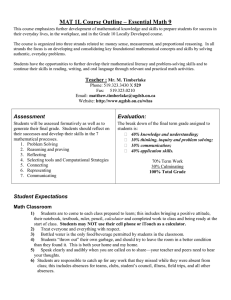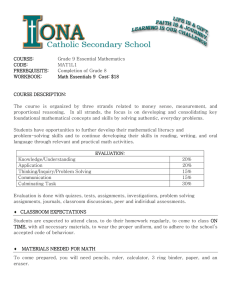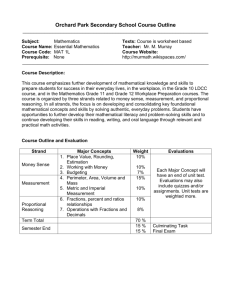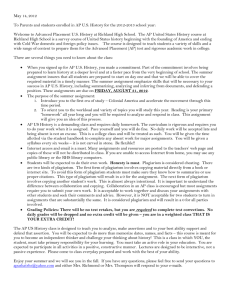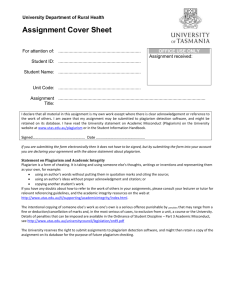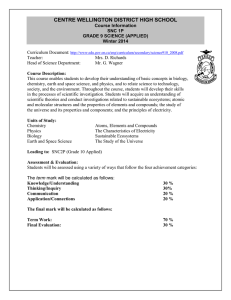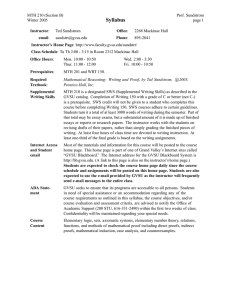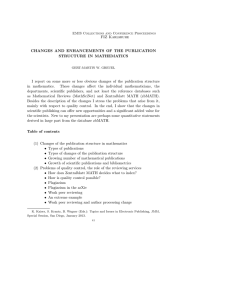MAT2L Course Outline
advertisement
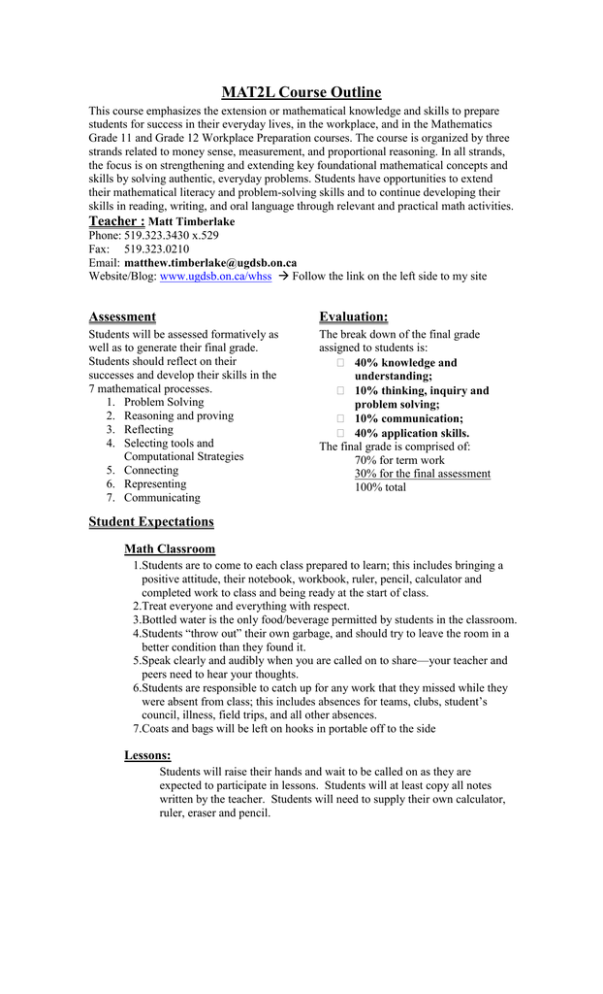
MAT2L Course Outline This course emphasizes the extension or mathematical knowledge and skills to prepare students for success in their everyday lives, in the workplace, and in the Mathematics Grade 11 and Grade 12 Workplace Preparation courses. The course is organized by three strands related to money sense, measurement, and proportional reasoning. In all strands, the focus is on strengthening and extending key foundational mathematical concepts and skills by solving authentic, everyday problems. Students have opportunities to extend their mathematical literacy and problem-solving skills and to continue developing their skills in reading, writing, and oral language through relevant and practical math activities. Teacher : Matt Timberlake Phone: 519.323.3430 x.529 Fax: 519.323.0210 Email: matthew.timberlake@ugdsb.on.ca Website/Blog: www.ugdsb.on.ca/whss Follow the link on the left side to my site Assessment Evaluation: Students will be assessed formatively as well as to generate their final grade. Students should reflect on their successes and develop their skills in the 7 mathematical processes. 1. Problem Solving 2. Reasoning and proving 3. Reflecting 4. Selecting tools and Computational Strategies 5. Connecting 6. Representing 7. Communicating The break down of the final grade assigned to students is: 40% knowledge and understanding; 10% thinking, inquiry and problem solving; 10% communication; 40% application skills. The final grade is comprised of: 70% for term work 30% for the final assessment 100% total Student Expectations Math Classroom 1.Students are to come to each class prepared to learn; this includes bringing a positive attitude, their notebook, workbook, ruler, pencil, calculator and completed work to class and being ready at the start of class. 2.Treat everyone and everything with respect. 3.Bottled water is the only food/beverage permitted by students in the classroom. 4.Students “throw out” their own garbage, and should try to leave the room in a better condition than they found it. 5.Speak clearly and audibly when you are called on to share—your teacher and peers need to hear your thoughts. 6.Students are responsible to catch up for any work that they missed while they were absent from class; this includes absences for teams, clubs, student’s council, illness, field trips, and all other absences. 7.Coats and bags will be left on hooks in portable off to the side Lessons: Students will raise their hands and wait to be called on as they are expected to participate in lessons. Students will at least copy all notes written by the teacher. Students will need to supply their own calculator, ruler, eraser and pencil. Work Periods: Students will work quietly and independently during work periods. Investigation Periods: Students will work at and talk softly about their assigned tasks. Assigned work: Each day about one hour of work will be assigned, you are responsible to have it completed before the next class, even if you are absent, (get a study buddy, make advanced arrangements, phone/email, etc). Completed Work: Students should attempt assigned questions, and present a clear solution to these questions in their work books. Students should then verify the bottom line of their solution with the answer in the back of the text book. If a student finds that they are “wrong” in less than 10% of those questions then the student should ask about those questions at the start of next class. If a student finds many of their answers are “wrong” then the student should seek extra help outside of classroom time. Assessments: Quizzes and tests require that students communicate in absolutely NO WAY, (i.e. no talking, tapping in code, passing rulers, passing calculators, passing pencils etc.) When work is assigned to be handed in, students are expected to be the original authors of the work that they hand in, (i.e. no copying). Due Dates: Assignments are to be completed and submitted in a reasonable amount of time, (determined by the teacher). Any assignment that is submitted after a due date is a “late assignment”. Late assignments must include a completed; parent signed “missed assignment form” (including a reason for the lateness). Late assignments will receive a grade, but once a solution set has been presented to a class the grade can only be pass/fail. Plagiarism: Wellington Heights Secondary School has a rigid plagiarism policy outlined in your student handbook. In mathematics students need to be extra careful that the work they submit is their own. Plagiarism includes copying, (from a book, the internet, a journal, a peer’s solution, etc) and submitting it as your own. Plagiarism also includes getting help, (from a teacher, peer, friend, tutor, etc) and submitting your solution without actually understanding it; in this case the fault is not in getting the help, the fault is in submitting your work as being your thoughts when those thoughts are not actually your own. A good guide for you to use when you submit your work is that you should be able to sit alone and produce a solution without copying from any source, (even your earlier draft). Cut here. Keep the above for your notebook, and return the bottom to your teacher I, ______________________ understand the above; I will do my reasonable part to meet the expectations of this course. ________________________________________________________________________ Parent/Guardian signature Student __________________________________ Parent e-mail contact
